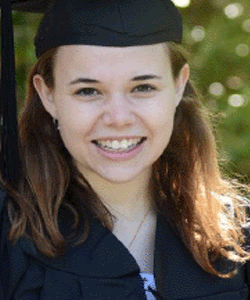And now that you don’t have to be perfect, you can be good.”
This is what one character, Lee, says at the end of John Steinbeck’s novel East of Eden. I graduated this past May, and these words have been keeping house in my brain ever since, proving at times to be an assemblage of unruly residents I’d rather evict as I make sense of what has just transpired.
The thing is, I want to believe in Steinbeck. I want to believe in me. But life in the “real world” is strange, and curious things keep happening to me: my ringing laugh reduced to a whisper during happy-hour in the West Village. A recurring moment of panic before I do anything on the Internet. The slightest buckle of the knees as I’m waiting for the 6 in the sickly heat of the underground.
Something out there is scaring me.
During the final weeks of college, my friends and I talked a lot about fear. We talked about how it was the emotion presiding frustratingly over all the pomp and circumstance, how sometimes we awoke alone, sweating—but unable to pinpoint why. The air-conditioning in our off-campus apartments actually worked well; finals were over. And yet, the unease persisted.
In a half-effective attempt to calm myself, I did what I always do and turned to words—Steinbeck’s, more specifically. But when I did, I found that cognitive roadblocks abounded: It might be that goodness follows the release from some mandated perfection. But it is also true that I (just finished with my first week at my first real job) haven’t yet released myself from perfection’s custody. Worse, I can envision a world in which I never do. There are these insidious thoughts that invade some evenings as I creep back to my room alone, tired and half-fulfilled, carrying the briefcase that seems comically out of place.
What if, despite attending a university that practically told me I was destined to become great, I never actually get to be someone important?
I’ve started telling people I meet at parties that I’m an artist, a part wish, part inside joke with my friends that usually surprises as a response to the obligatory “so what do you do?” The concomitant smirk belies a darker reality: I’m terrified. I’m terrified I’ll never earn the title I toss out half-jokingly over drinks. I’m terrified that the future I envisioned for myself—the one where I top all the lists, and go to all of the readings, and where some of the readings are mine—will escape me, remaining illusory until I wake up one day and realize “it” never happened.
As Junot Díaz writes in his novel This Is How You Lose Her, “as soon as you start thinking about the beginning, it’s the end.” In a similar vein, the process of leaving college and transitioning to whatever comes after has been fraught with flashbacks, as if every exit necessitates some return to the entrance that made it all possible. While my time at Duke instilled in me many things, I worry now that one of them is this unshakeable obsession with the amazing. The national and the noteworthy. The perfect.
In roundabout (and some not-so-roundabout) ways, the elite university admissions process itself prescreened for this very condition. Four years ago, we were excellent. You could see it rolling through and off of us like waves, a thing both inspiring and horrifying, providing the catalogue of accomplishments that features prominently in The Speech, a welcome-to-Duke address given in the chapel to first-years every August. But after that inventory (“One of your classmates runs a nonprofit in Bangladesh! One is world-class in equestrian!”), it was hard not to feel only a stronger variant of something we have felt, in degrees, our entire lives—namely, that perfection is the only option, the only answer choice worth bubbling in on the standardized test that is life.
I remember feeling relieved rather than ecstatic when I got the call that started all of this, the one informing me that my higher education would be paid in full by a scholarship I was lucky to receive. It was as if my subconscious was saying then, You were the best. And thank God, because can you even imagine what would have happened if you weren’t?
There are many things I haven’t done for fear that “perfect” might prove unattainable, that I might end up with “good” instead—a consolation prize not even worthy of a spot in the garage. Essays and poems and maybe even novels I haven’t written. Relationships I haven’t started. It’s challenging and it’s scary, but I’m trying, atom by atom, to piece together new dreams, to envision a world where my doing (or being) is enough.
Maybe I’ll write a book rather than a best-seller. Maybe I won’t split my time between East and West Coast literary circles, but the New York Public Library will always be beautiful at night, when the reading room on the second floor clears out a bit and you can hear the radiator humming in the winter. I might not live ten floors above Central Park. But I’m sure I’ll go on the weekends, and the sun will strain through layers of tree such that the sidewalks appear latticed with light.
And it will be good.
Fernelius ’18 majored in English, was heavily involved in creative writing at Duke, and was awarded the Academy of American Poets University & College Poetry Prize. She works at an education start-up in New York City.

Share your comments
Have an account?
Sign in to commentNo Account?
Email the editor